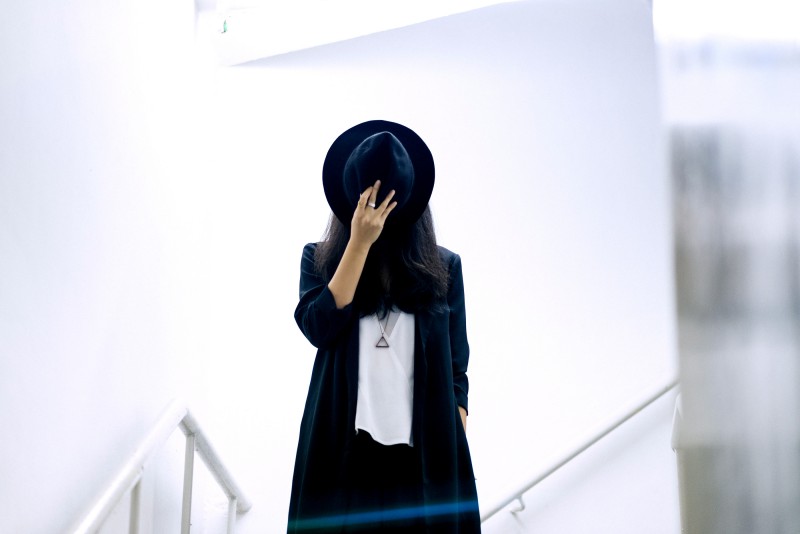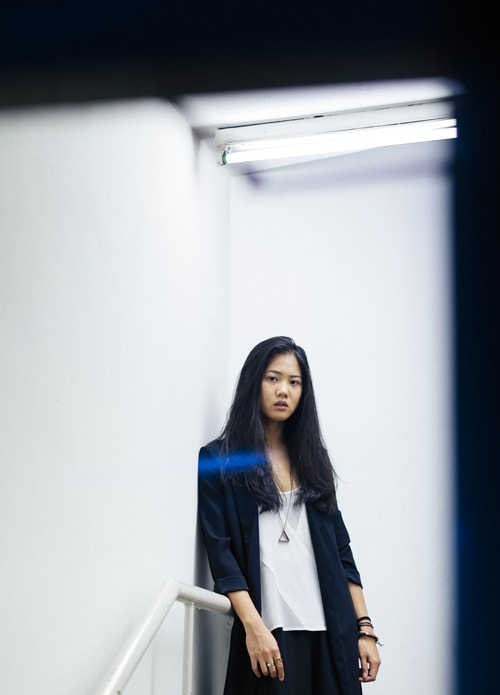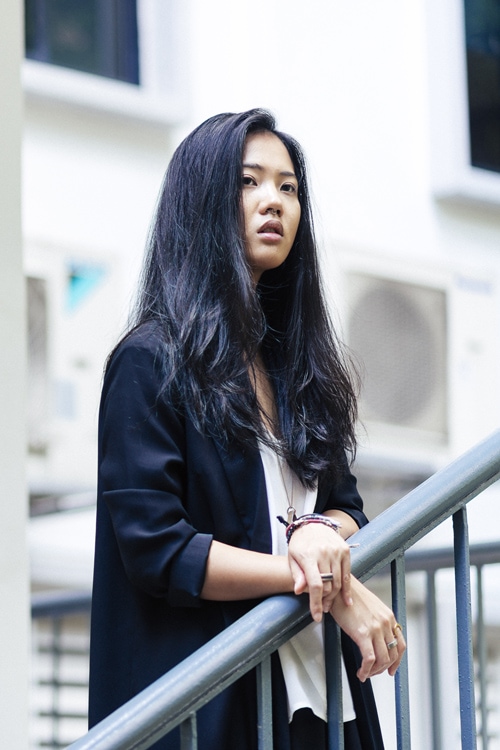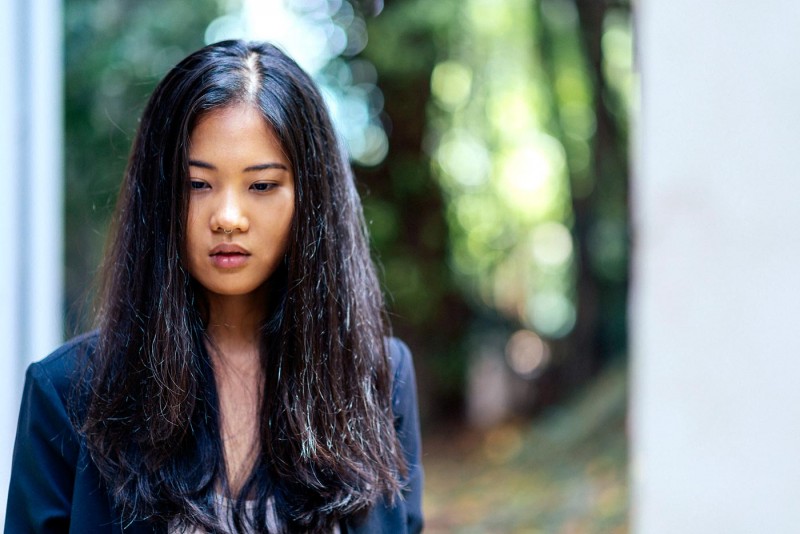Dione Song – To be Heard, To Inspire
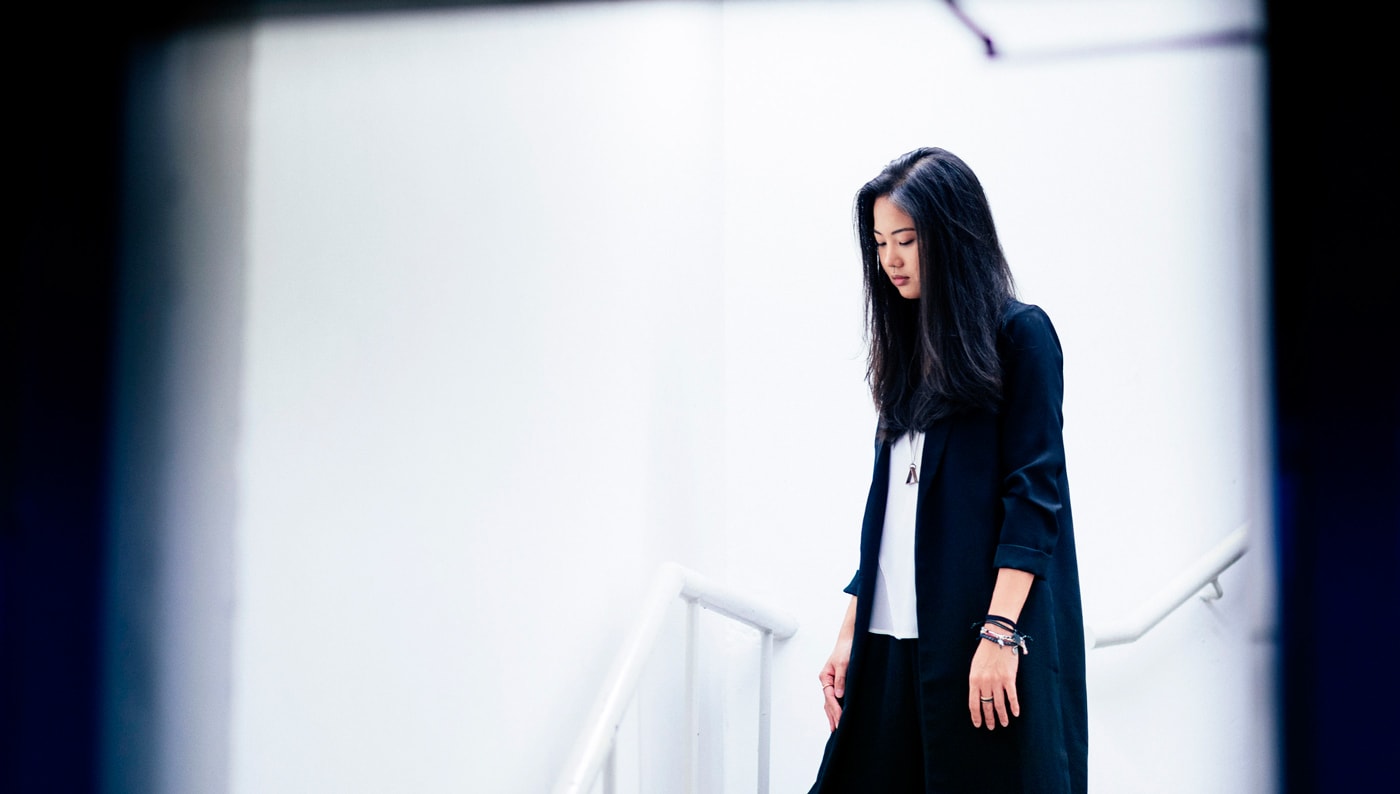
On paper, Dione Song could have made her mark on Wall Street, fighting tooth-and-nail, in a cut-throat environment where money makes the world go round. NYU Stern, check. Goldman, check. Morgan Stanley, check. But somehow, crunching numbers isn’t Dione’s cup of tea. “I tried out different areas in finance because I thought I could find my niche, be comfortable and enjoy it. But I didn’t.” You would never guess just by looking at Dione. Septum piercing aside, her long, dark hair parts interchangeably, framing her face like untied curtains, sometimes conjuring the soft ease of a late-60s folk sylph, other times evoking the air-dried fuzz of a Woodstock goer. Her sartorial choice goes back to basics, akin to a page out of T by Alexander Wang’s catalogue. She is wearing a minimalistic white tee, black slacks and canvas sneakers.
As Dione attempts to catch the waiter’s attention, I quickly conclude that an image of her in a power outfit comprising a tight pencil skirt, delicate silk blouse and bunned-up hair isn’t quite a good match with her free-spirited aura. “Are people surprised at how young you are?” Dione takes a swig at her orange and carrot juice and replies eloquently, “Yeah, and it doesn’t help that I look younger than my age.” I break into a smile, “How old are you again?” “Twenty-seven,” says Dione in an alluring manner that sometimes descends into a laugh. Her answers are thoughtful and seasoned with wisdom – something that doesn’t necessarily come with age.
WY-LENE YAP: Why did you choose to go to NYU Stern?
DIONE SONG: It was a last minute switch. I was going to study architecture in Singapore at NUS, but it was a 6-year course which was a long commitment. I also wasn’t sure if I really wanted to specialise in that area. Eventually, I decided that going to business school would give me more versatility.
WY-LENE: I would assume the city played a huge part too.
DIONE: Yeah, and Stern has a wonderful business programme.
WY-LENE: Stern kids are typically nerdy and uncool. What kind of student were you?
DIONE: I worked smart and did whatever was required to graduate. [laughs]
WY-LENE: How was your New York experience?
DIONE: It was good. New York is definitely more vibrant than Singapore.
WY-LENE: Were you a hipster who hanged out in the East Village?
DIONE: [long pause] Halfway through school at NYU, I wanted to go to Parsons. I think a lot of people don’t know what they want in college and I was one of them.
WY-LENE: Was living in New York a definitive period in your life?
DIONE: I wouldn’t credit everything to New York, but it did change a lot of my perspective. I also left banking to join an e-commerce. If I look at my peers who have studied in Singapore, they want more stability. Success, sometimes, to other people might be something more traditional and generic.
WY-LENE: Like climbing the corporate ladder?
DIONE: There’s nothing wrong about it and that’s what a lot of people still prefer to do in Singapore. Cities like New York, measure success quite differently. It is more about starting your own thing and doing something risky or simply following your passion.
WY-LENE: Did you have a hard time adjusting when you came back to Singapore?
DIONE: Not really. I couldn’t see myself working in New York anyway. To be honest, I was grappling with whether I should go into finance or not – even during my college days and throughout the first year (back in Singapore). My parents preferred me to do banking, so I tried out different areas in finance because I thought I could find my niche, be comfortable and enjoy it. But I didn’t.
WY-LENE: What didn’t you like about the industry?
DIONE: You get pigeonholed and you don’t get to explore a lot of different things, especially at the junior levels for IB. Autonomy and ownership are kept at a minimal level. I am sure it is different for the senior positions.
WY-LENE: So I guess you are never going back.
DIONE: [laughs] Not anytime soon.
WY-LENE: How did you end up at ZALORA?
DIONE: Totally by chance – I rekindled with an old college friend (ex-McKinsey consultant), who joined ZALORA and he told me about Rocket Internet and the various opportunities and interesting roles: like entrepreneur-in-residence (fresh out of school kids who enter the company, get thrown different projects and find a way to problem solve). My friend also introduced me to one of the guys from Rocket Internet, and at that time, he was looking to start a new venture in Singapore – similar to Square and what they were doing in the States. Basically, that was how the conversation started.
WY-LENE: Was the guy that you met from Rocket Internet, one of the founders?
DIONE: Nope. He was one of co-founders of the new venture. Rocket Internet normally finds 2 to 3 people to start a new venture and ZALORA works the same way too. Anyway, that venture never took off after changes in MAS regulations regarding payment methods. Thereafter, I was introduced to the ZALORA team. It wasn’t in my plan to join ZALORA as I wanted something more entrepreneurial.
WY-LENE: But you joined in 2012?
DIONE: Yes.
WY-LENE: Is it true that ZALORA hires a lot of ex-bankers?
DIONE: We have a couple of ex-bankers and ex-consultants. More managing consultants.
WY-LENE: How many Managing Directors are there in Singapore?
DIONE: Two covering Singapore. We have another Managing Director who oversees Operations for Singapore, Malaysia and Hong Kong.
WY-LENE: What’s your portfolio then?
DIONE: Mine is specifically Singapore, where I cover marketing and our new platform ZALORA Marketplace.
WY-LENE: How did you manage to rise up so quickly?
DIONE: At the start, I was doing on-site analytics (tracking banners, optimising the customer’s journey, etc) and my role expanded and I was given more opportunities to grow. ZALORA is a young company and the people that they hire are also around my age. The structure and DNA breed a very entrepreneurial mindset and there are a lot of opportunities if you’re willing to seize them.
WY-LENE: How many people do you have under you?
DIONE: Around 35.
WY-LENE: You used to be the Marketing Director before you became the MD. Did you have any background or knowledge in marketing?
DIONE: I learnt everything on the job – which meant also making mistakes and learning from them. Two years ago, there weren’t that many big players in the scene other than blogshops. From a marketing point of view, how do we target our customers? It really depends on your individual surfing and purchase behaviour. For our website for instance, you might be seeing a whole different set of banners versus someone else as we optimise that to maximise conversion rate. In our company, we also believe that if you’re unsure about something, test it. We ran and still do run a lot of A/B tests. When we started our website in 2012, I used to sit with the graphic designers to discuss even the types of colours that will work better on banners for various call to actions so as to emote a relevant response and reaction.
WY-LENE: What were some of the biggest campaigns that you have implemented?
DIONE: The click-and-mortar (pop-up) store at ION would have to be the biggest to date. It was a huge risk to go that innovative into an offline space and I don’t think we have seen such initiatives in Singapore. It’s a pretty new concept and people here still see online and offline retail as two separate entities – not meshing or integrating well.
WY-LENE: If I remember correctly, MDS made the transition from online to offline too.
DIONE: Yeah, they did. But for us, we represent e-commerce and that is our USP. It wasn’t so much about selling per se, but also educating consumers about online shopping – it’s not that intimidating, we don’t eat your money, there are safe payment systems, free returns, and Cash on Delivery. If you look at the retail pie right now, a very small part of it is online. The bulk of it is still offline, which means a lot of people are still not converting or comfortable with online shopping. We also wanted to go offline because one of the key issues was about the ‘fit’ – since you can’t try on the clothes. So with this space, customers can touch the material, find the correct sizing, and make more informed decisions.
WY-LENE: How long did you run the pop-up store for?
DIONE: From October 2014 to end January 2015. We ran the pop-up store with our current setup – without any additional resources.
WY-LENE: How was the response?
DIONE: Great footfall and most welcomed this new concept!
WY-LENE: How about sales?
DIONE: I can’t reveal the actual figures but we did well. In fact, ION asked us if we would like to do another one there.
WY-LENE: Are there plans for another one then?
DIONE: Yes, in April at Bugis+.
WY-LENE: How’s the working environment like?
DIONE: People definitely take ownership of their work and they are always eager and hungry to learn more.
WY-LENE: Does it get competitive?
DIONE: Well, it’s not cut-throat if that’s what you’re asking. Generally, we are quite collaborative.
WY-LENE: How would you describe your leadership style?
DIONE: We have weekly meetings to discuss everyone’s objectives and also understand what different team leaders are working on. I let my team leaders take charge of their respective portfolios but I’m pretty hands-on for the bigger campaigns. I do get a bit OCD. [laughs]
WY-LENE: As a leader, sometimes you have to get your hands dirty.
DIONE: I try to do “softer” meetings on a monthly basis, where we talk about inspirational and aspirational stuff.
WY-LENE: Do you ask questions like: where do you see yourself in 5 years?
DIONE: [laughs] No, no, no… just general check-ins and reminders of why they joined ZALORA in the first place. For instance, in our new office, we have a decal on the wall which says Ikigai, a Japanese word for why I wake up in the morning. To me, it is important that my team enjoys their work.
WY-LENE: Is it hard to find the right people? Not everyone wakes up with a sense of purpose.
DIONE: It takes a while and recruiting is not easy.
WY-LENE: What do you look for when you hire someone?
DIONE: Firstly, aptitude and experience – the person has to have the skills for the particular role. The second and probably the most difficult one is their attitude because it is hard to accurately sense this during an interview – candidates can say whatever they want, but who knows until they are put to work.
WY-LENE: So what kind of boss are you?
DIONE: I think I can switch easily from being a friend to saying “no” to something. But sometimes, I do struggle with that because my case is slightly different – I didn’t start off as a Managing Director – a lot of people I work with have grown into the company with me, so that can be a bit of a grey area. Ultimately, I am friendly towards my staff but when it comes to work, it is important to draw the line.
WY-LENE: What do you think makes ZALORA so successful as a company?
DIONE: We do things really fast – turnaround time for projects is super quick. Things that bigger companies take months to do, we can churn out in a week. The industry as well as trends change a lot, so we tend to shift our focus accordingly. From an outside perspective, it may look messy but I see it as being reactive – we need to understand what’s going on in order to leverage on new trends/platforms. We are also pretty aggressive when it comes to business development, partnerships, online marketing, etc.
WY-LENE: You have a lot of money so you can afford to be aggressive.
DIONE: Well, not quite. You still strive to maximise your dollar and having huge investors in play means always having to be accountable for that and ensuring that you deliver.
WY-LENE: Who are some of your biggest competitors?
DIONE: Qoo10 – they have a huge long tail. Pricing is still very important for e-commerce as people still look for good deals. That being said, branding and customer experience are equally important to us. Based on the findings from our brand surveys, many of our competitors are actually offline retailers, like Uniqlo, H&M – fast fashion guys who offer the same categories and affordability as us.
WY-LENE: Does ZALORA take on inventory risk?
DIONE: With any e-commerce b2c (not matching platform), there is inventory risk involved but we try our best to minimise it.
WY-LENE: Which segment brings in the most sales at the moment? Apparel, accessories, shoes or beauty products?
DIONE: Women’s apparel. However, men’s wear sales are growing and that constitutes more than a third of our business now.
WY-LENE: How’s your own private label Ezra doing?
DIONE: It’s now known as the ZALORA label. The ZALORA label started off as Ezra and we launched it as a capsule collection to test the market first, before making it official. At the moment, the ZALORA label is the biggest part of our business. There are also other brands that are part of our private label, like Inner Circle (corporate wear). We also have sub lines like ZALORA basics and premium. In addition, depending on the season, we also carry the Lunar New Year and Hari Raya collections (Zalia) which perform extremely well as they cater to the local sensitivities and needs.
WY-LENE: Any plans for a collaboration with a well-known fashion designer?
DIONE: Yes, hopefully. We might be working with one soon – something similar to what H&M does. We have done smaller scale collaborations before in other markets, for example, in Malaysia, where we have worked with renowned Malay designers like Jovian Mandagie and Rizalman.
WY-LENE: If you had a choice, who would you want to work with?
DIONE: Alexander Wang.
WY-LENE: I had you pegged as an Alexander Wang girl.
